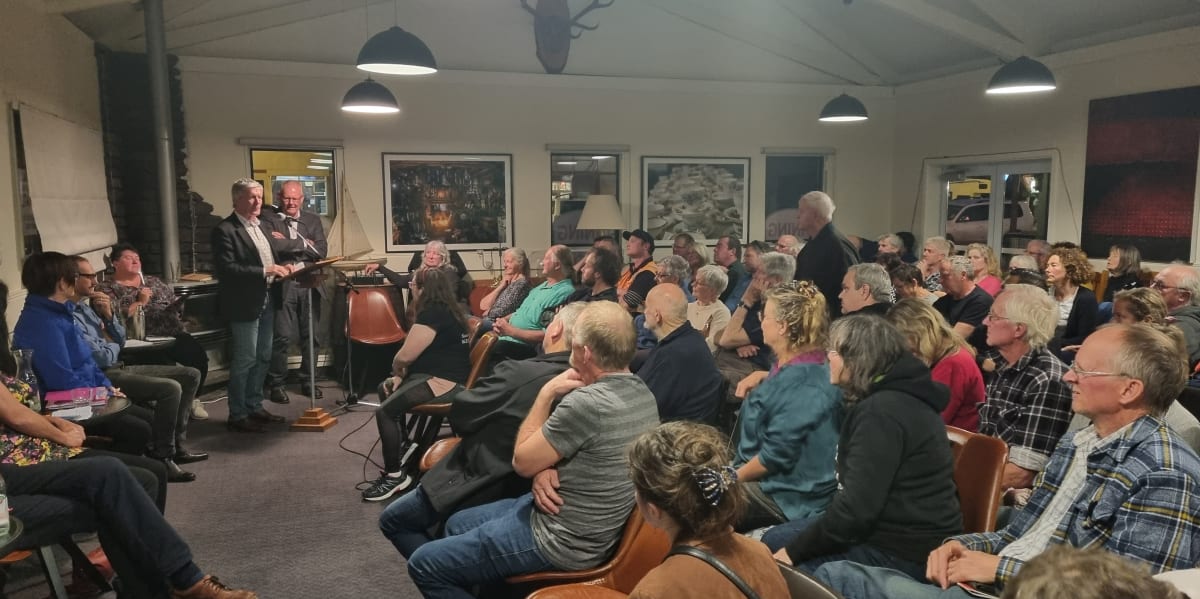West Coast Sees Red, Goes Blue
Politics
Independent candidate Patrick Phelps helps open the exit door for Labour MP Damien O’Connor letting National’s Maureen Pugh slip in
Looking back the signs were there.
The birthplace of the Labour movement was poised to vent its displeasure with the party – and boot out long-serving MP Damien O’Connor.
“You tell us to fight for our hospital but you didn’t fight for it, Damien!” shouted a Reefton woman at a meet-the-candidates meeting last month.
“It was a rest home, not a hospital,” said the beleaguered MP, provoking howls of disapproval from locals still simmering over the closure of the town’s care home.
And “Good girl!” they shouted, when National’s Maureen Pugh assured them her party was “very pro-mining”.
Last Saturday night O’Connor’s 2020 election tally of 20,753 votes was slashed in half; his 6200-vote majority vanished and he was left trailing National’s Maureen Pugh by 915 votes.
It’s not the first time the West Coast-Tasman electorate has punished O’Connor for the perceived sins of Labour: he lost the seat for one term to Hokitika’s Chris Auchinvole in the 2008 National landslide.
And in 1990 the West Coast went blue for three years when former regional council chair Margaret Moir, buoyed by the outrage of voters feeling betrayed by the neo-liberal onslaught of Rogernomics, snatched the seat from Labour’s Kerry Burke.
This time though there was no great surge of support for National: Pugh won 3000 fewer votes than she did in 2020.
Testy
But that was still enough to oust the amiable O’Connor, who uncharacteristically told a female TV reporter yesterday to “fuck off” as he headed for the parliamentary loos.
Having won the seat eight times in 27 years since it was created in 1996 he’s perhaps entitled to feel a little raw.
At No 10 in the Labour hierarchy, the former Minister of Agriculture, Export Growth and Rural Communities will be back in the Beehive as a humble list MP.
That’s assuming he doesn’t choose to retire to his Buller farm – he hasn’t responded to Newsroom’s request for his thoughts on the party’s and his personal drubbing.
But leaving aside the general grumpiness of the punters, O’Connor was up against a novel challenge in this election in the person of independent candidate Patrick Phelps.
The 29-year-old from a Westland farming and mining family is a former RNZ journalist, farm worker, tour guide and manager of Minerals West Coast.
He’s possibly the most articulate advocate the industry has ever had.
And his campaign, spruiking the interests of primary industries on the coast – and the potential for a third and independent MP – struck a chord.
“If you cast a vote for Damien or Maureen you’re not maximising your vote.
“Both of them will be in Parliament anyway under MMP,” Phelps told meetings up and down the electorate.
Only an independent could counter political narratives and policies dreamed up in universities and comfortable cafes a world away from the realities of life on the West Coast, he maintained, to enthusiastic applause.
Both National and Labour had dashed the region’s hopes of generating affordable electricity from a hydro scheme on the remote Waitaha River, he reminded voters.
“National’s conservation minister Maggie Barry sat there with folded arms and it never got over the line.
“Under Labour, Winston Peters was deputy PM when Minister David Parker rejected it.
“It doesn’t matter who’s in power – until we have an independent MP we’ll never have the representation we need.”
That pitch earned Phelps an impressive 5246 votes, about half O’Connor’s tally on the night.
Miners for minors
But while Phelps was clearly the main reason for the MP’s defeat, there were other factors at play.
Voter turnout for West Coast-Tasman was well down at 36,000, a drop of 7000 on 2020.
And unusually the minor parties mopped up about 6000 electorate votes between them.
Act pulled 2100, New Zealand First 1500, the Greens 2000-plus and even the tiny fringe parties plundered the electorate vote: Sue Grey’s Outdoors and Freedom Party picked up 1200 and Liz Gunn’s NZ Loyal 1100 (figures rounded to the nearest 100).
With her election-night majority of 915, Pugh says she is “cautiously jubilant”.
She’s seen colleagues with majorities of 1600 toppled in the past by special votes.
The South Westland farmer believes O’Connor’s electorate profile slipped as his ministerial duties increased.
“It’s a dilemma for senior ministers.
“He’s been overseas a lot on trade deals doing good work for the country, but he stopped being present in the electorate and you don’t have that ongoing relationship.”
Pugh, who recently lost her daughter to cancer and nursed her at home in the final stages, says she did her best to cover the huge electorate during the campaign spending long hours on the road between Haast and Golden Bay.
She hasn’t yet properly grieved for her daughter, she says, and she is hoping to take time off soon do so.
Pugh’s political priorities in what will be her third term as an MP are to educate her colleagues on the marvels of modern mining, the prodigious quantities of pristine freshwater on the coast and the potential to make the region self-sufficient in electricity through such small hydro projects as the Waitaha.
The rejected run-of-the-river project will be revisited by the incoming government, she says.
“We’ve already had a variety of people down there to have a look and understand it.
“There’s a process to go through so I can’t say it’ll be approved.
“But there’s definite support for renewable energy and if there’s one thing we do well on the West Coast it’s water.”
Phelps says he’s not sure if he’ll stand again, nor is he quite sure how he feels about his part in O’Connor’s defeat.
But he’s pleased with his result and with having given a voice to 5000 voters who believe the West Coast’s points of difference – and point of view – are too often ignored in Wellington.
Made with the support of the Public Interest Journalism Fund


